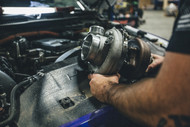What happens when turbo goes out on diesel?
26th Oct 2022
by Jordan Davidsen
When you are running a diesel engine, a turbocharger can be an invaluable asset to your driving experience. Often referred to as simply a “turbo”, these parts are fitted to an engine in order to increase its performance in a variety of ways. Turbos boost the power of cars and trucks, helping them reach top speeds faster. They enhance the power of your engine without requiring the effort (and cost!) of an entirely different engine. These parts are also fuel efficient and eco-friendly, making for an all around beneficial experience from their addition.
Turbos essentially work by pushing more air into an engine. This happens through the use of exhaust fumes, which function to spin an air pump inside the turbocharger. The influx of additional air increases the combustion efficiency of the engine, which therefore increases its horsepower.
A turbo can be incredibly useful when operating a vehicle. Like any part, though, a turbo is susceptible to failure. Luckily, turbos give off many signs of gradual failure, and these signs can make it easy to know when something is wrong and whether something must be done to fix it.
Slow Acceleration
One of the most prominent features that can tip you off to something being wrong with your turbo is a sudden decrease in acceleration. A turbo’s main function is to provide more horsepower to the engine, and an increase in horsepower should imply an increase in speed; this also includes the acceleration. The power of your engine should be felt when you have a functional turbo, and in turn you should be able to feel a lack of power that signifies your turbo may be failing.
Quick Oil Burning
If you are quickly running low on engine oil, it may be a sign that your turbo is beginning to fail. The turbo can be investigated to look for signs of a leak, or perhaps for any signs of oil deposit in your turbo pipe; regardless, if you can determine that the issue doesn’t have anything to do with the engine itself, it’s likely that a failing turbo is to blame.
Whining Noise
A turbo that is in gradual failure will begin to make a loud whining noise that you can’t miss. As the problem with your turbo worsens, so too will the sound; it’s as if the turbo itself is telling you to take a look at it. When you hear a high-pitched, siren-like noise coming from your engine, consider checking out your turbo.
Excesive Exhaust
A worn out turbo will have issues with the seals and will begin to crack, causing oil to leak into the exhaust system of the engine. A healthy engine’s exhaust will be clear; you can tell that there is a problem with your turbo when your vehicle begins to emit a lot of exhaust in a distinctive bluish-gray color. This becomes worse when you drive quickly and engage the turbo; noticing this smoke worsen when you drive at speed means it is almost certainly because of your turbo./p>
Check Engine Light
Your engine management light, or check engine light, can come on for a variety of reasons. If, however, it is coupled with any of these other symptoms, the check engine light is probably related to your turbo. Even if it ends up not being related, you should get your engine checked out if this light comes on anyway; it is better to be safe than sorry!
A turbo failure can be related to any of these symptoms, and it is important to get your turbo checked and possibly replaced. Luckily, if you happen to need a new turbocharger for a turbo engine, US Diesel Parts has you covered. For high quality diesel engine parts, make sure to contact us so that you can get the best experience and the best prices for your turbo.

